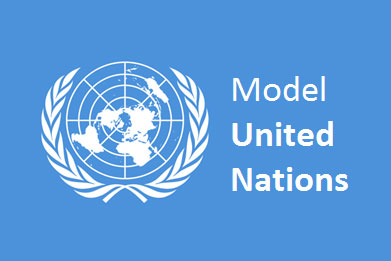Model U.N.

March 12, 2019
Model UN (MUN) is a simulation of the United Nations (UN) with the goals of encouraging cooperation between students and promoting understanding of the global community. This organization began after the devastation of World War II. Its central mission is “the maintenance of international peace and security.” The UN works to prevent conflict, establish peace, as well as maintain that peace The program has made the promotion and protection of human rights a key purpose and guiding principle. Their Universal Declaration of Human Rights brought human rights into the realm of international law. Another purpose of the UN is “to achieve international co-operation in solving international problems of an economic, social, cultural, or humanitarian character.” The UN is reliant upon the international community to coordinate humanitarian relief operations. The UN promotes sustainable development and upholds international laws.
Similar to the real UN, MUN requires compromise to function efficiently and to help the world. At MUN, we research the released topic from the point of view of the assigned country, and the countries are randomly assigned to each participant. The topics require students to research and understand their country’s stance. The overall goal is to create a resolution while making sure it will benefit most of the people in the global community. We acknowledge that each country faces its own problems but hope to demonstrate how the world faces problems and fulfills its duty to help each other. The delegate must present his or her solution and work with other delegates to create resolutions that will be presented. The delegate will learn how to debate his resolution and look for problems in other resolutions. The delegate must understand solutions that have already been attempted and why they have failed or succeeded. In this process, each delegate will learn essential public speaking techniques, how to write resolutions, how to defend their position, teamwork, and obtain an understanding of how the UN program works.
Another goal of MUN is to encourage the acquisition of knowledge and an understanding of the problems faced by the worldwide community. As we research, we take note of important issues in our own country and how we propose to fix them. Compromise is stressed so that laws can be passed to help the global community. We learn the official rules of the UN and how to debate with parliamentary procedures; we also train how to spot inconsistencies within other delegates’ arguments and resolutions. Following this, we visit a nearby college or high school, as a delegate to a randomly assigned country, and represent our own country’s interests and work to resolve the problems present in the given topic. We must debate other’s resolutions and work with delegates at the competition to create joint resolutions and then defend the resolution and garner support for it.
This is a newly created club and an exciting opportunity made available at our high school. We also have plans to possibly visit the actual United Nations in New York. We hope to promote cooperation in the community and create an understanding that the world is not characterized by division and competition. Instead of continuing that trend, MUN promises to ensure a sense of community and an understanding of how to work together to achieve a common goal.